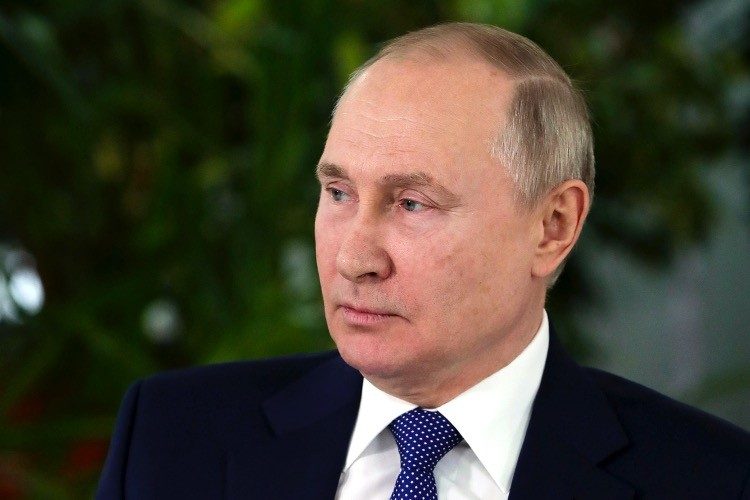
Vladimir Putin may be winning the war on the ground in Ukraine, but he’s losing the propaganda war abroad and at home. So says a national security expert who also warns of what would turn the Russian leader’s home-front public-relations fortunes around: NATO involvement in the conflict.
In fact, states Tom Nichols, a professor at the U.S. Naval War College, Putin may want to provoke NATO into intervening in Ukraine visibly in order to have a boogeyman against whom to rally his increasingly demoralized people.
Nichols issued his warning in the liberal Atlantic in a piece entitled, “Stay Calm, America: Putin’s violence may still get worse. But Americans shouldn’t root for a dangerous escalation of hostilities.”
The professor’s message is essentially Ben Franklin’s timeless warning, “Passion governs, and she never governs wisely.” He begins by pointing out that he understands and shares the rage many feel upon seeing images of suffering Ukrainian innocents. Yet he also points out that cooler heads must prevail. Nichols then adds some perspective, writing that
public figures and ordinary voters who are advocating for intervention also do so from the comfort of offices and homes where they can sound resolute by employing clinical euphemisms such as no-fly zone when what they mean is “war.” For now, fidelity to history requires us to remember that this isn’t the first time we’ve had little choice but to stand by and watch a dictator murder innocents.
In some cases we were unwilling to bear the costs of intervention. In others, we were deterred by the immense risks of a nuclear confrontation. During the Cold War, we did not face down the Soviets in Hungary in 1956 or Czechoslovakia in 1968. We did not send troops to drive them from Afghanistan after their 1979 invasion. (In Afghanistan, we provided material assistance to raise the cost of occupation, and we succeeded in helping the local population inflict serious wounds on the Soviet war machine, but hundreds of thousands of Afghans were dead and millions had fled as refugees by the time the Soviets threw in the towel.)
In the 1990s, we allowed war crimes and ethnic cleansing to reach horrific levels in Rwanda and the former Yugoslavia. More recently, America chose to stand aside as the Syrian regime used chemical weapons against civilians in a war that has taken well over half a million lives…. We pointedly avoided too much criticism of the Russian war in Chechnya and now do the same with regard to Chinese crimes against the Uyghurs.
(Of course, Russia can’t buy our pseudo-elites off the way Beijing can.)
Nichols then states that while the day could come when the West wages a hot war against Russia, our actions must be governed by reason, not rage. He also believes that Putin miscalculated and, while the Russian will carry the day in Ukraine in the short run, he’ll be lucky to emerge from this fiasco with his military intact and may even lose power.
What could save Putin, however, is provoking the West into an attack, says Nichols. The professor reiterated this position recently on MSNBC, saying that Putin expected a quick victory and “to be greeted as a liberator” (I’m not so sure about that), but “it didn’t happen.” He continued, saying Putin
has had to clamp down on internal dissent in Russia…. He’s been shutting down radio stations and television stations, and I’m sure that he’s deeply concerned about, now, where this goes next. That’s why he’s going to raise the ante on the violence.
The one thing that would allow him to turn to his own military and his own people would be to [be able] to say, “I told you so: This is a defensive war to stop Ukraine from becoming part of NATO; NATO is coming for us, they’re coming towards our borders, they’re killing our men and destroying our bases.”… I think at this point he may even try to draw the foul; he will try and provoke NATO in the coming days or weeks.”
If NATO involvement did create a problem, it wouldn’t be the first time. As I wrote last Thursday, citing Pat Buchanan and late Russia expert George F. Kennan, it’s arguable that NATO’s post-Cold War expansion has led us to this point. In fact, Kennan called this expansion “the greatest mistake of the entire post-Cold War period,” “senseless,” and a “colossal blunder” — and he largely predicted what has transpired today.
His and Buchanan’s point was that the anti-Soviet NATO’s raison d’être disappeared with the USSR. Yet instead of “standing down,” the alliance was expanded right up to Russia’s borders. This was alarming and humiliating to the Russians.
Kennan, while admittedly a globalist and a member of the Council on Foreign Relations, predicted the result of this, too. It would cause Russia to “develop much closer relations with … Iran and China,” he wrote, and would “be expected to inflame the nationalistic, anti-Western and militaristic tendencies in Russian opinion; to have an adverse effect on the development of Russian democracy; to restore the atmosphere of the cold war to East-West relations, and to impel Russian foreign policy in directions decidedly not to our liking.”
Kennan also warned that the decision would lead to “a new Cold War” with Russia — “probably ending in a hot one.”
We have this hot war now in Ukraine. And it could turn into a wider one, too, warns Buchanan. Putin cannot lose in Ukraine and retain power, yet he’s also unlikely “to accept defeat and go quietly,” he writes. So would the Russian exercise the “‘Samson Option’ — pulling down the pillars of the temple and taking your enemies with you?” Buchanan asks.
Given that Putin may be what too many other leaders are, a sociopath, this is a real danger. So as Tom Nichols counseled, it truly is time for cooler heads to try to avert a hotter war.


